How to Improve Patient Engagement in Surveys with AI
How to Improve Patient Engagement in Surveys with AI
How to Improve Patient Engagement in Surveys with AI



In the healthcare sector, qualitative market research presents unique challenges. Engaging patients for surveys requires tailored approaches and innovative solutions. AI-powered tools offer significant advantages in improving participant engagement and ensuring data quality. Let's explore how to recruit qualitative research panels in the healthcare sector, understand the specific challenges involved, and discover the role of AI-native survey builders in overcoming these challenges.
Qualitative Market Research Panel Recruitment in Healthcare
Recruiting participants for healthcare research involves navigating sensitive and often complex issues. Patients may have varying health conditions, levels of mobility, and accessibility needs. Here’s a step-by-step guide to qualitative research panel recruitment for patient engagement:
Define Research Objectives: Clearly outline what you aim to achieve with your study, ensuring it aligns with patient interests and concerns.
Identify Target Participants: Determine the specific patient demographics and conditions relevant to your research.
Design Accessible Recruitment Materials: Ensure that all recruitment materials are easy to understand and accessible to patients with different needs.
Leverage Healthcare Networks: Partner with healthcare providers, patient advocacy groups, and online patient communities to reach potential participants.
Use Patient-Friendly Language: Communicate in a way that is empathetic and avoids medical jargon.
Offer Incentives: Provide appropriate incentives that respect the time and effort of participants.
Ensure Confidentiality: Clearly explain how patient data will be protected and used.
Employ AI Tools: Utilize AI-driven platforms to streamline recruitment, personalize outreach, and manage participant data effectively.
Industry-Specific Challenges in Patient Engagement Surveys
Conducting patient engagement surveys involves several challenges unique to the healthcare industry:
Recruitment Difficulties: Identifying and reaching patients who fit specific criteria can be tough, especially in rare or niche medical conditions.
Data Quality Issues: Ensuring that responses are genuine and reflective of the patient’s true experiences is critical. Patients may provide socially desirable answers or misunderstand questions.
Time and Resource Constraints: Healthcare professionals and patients often have limited time, making it challenging to conduct lengthy or frequent surveys.
Privacy Concerns: Protecting patient data and maintaining confidentiality is paramount, necessitating stringent data security measures.
AI Tools to Tackle Healthcare Survey Challenges
AI-driven tools offer innovative solutions to the unique challenges of patient engagement surveys:
Natural Language Processing (NLP): NLP helps in designing patient-friendly survey questions and analyzing open-ended responses for deeper insights.
Machine Learning Algorithms: These algorithms detect patterns and identify fraudulent or poor-quality responses, ensuring data integrity.
Predictive Analytics: Predictive models forecast participant engagement and identify potential drop-off points, allowing for timely interventions.
Chatbots and Virtual Assistants: AI-powered chatbots engage participants in real-time, answer their questions, and guide them through the survey process.
Data Encryption and Security: AI enhances data security protocols, ensuring patient information remains confidential and compliant with regulations like HIPAA.
Future Trends in AI-Powered Patient Engagement
The future of AI in patient engagement surveys looks promising, with several trends on the horizon:
Personalized Surveys: AI will enable more personalized survey experiences, tailoring questions and interactions to individual patient profiles.
Real-Time Feedback: Enhanced AI capabilities will allow for real-time analysis and feedback, improving the responsiveness of healthcare research.
Integration with Health Records: AI will facilitate seamless integration with electronic health records (EHRs), providing richer data for analysis.
Enhanced Accessibility: AI-driven platforms will continue to improve accessibility features, ensuring surveys are inclusive for all patients, regardless of their abilities.
The Role of AI-Native Survey Builders
AI-native survey builders, like Metaforms, are revolutionizing qualitative market research in healthcare:
Streamlined Recruitment: AI automates and optimizes the recruitment process, ensuring that the right participants are selected efficiently.
Improved Engagement: AI-driven surveys are more interactive and engaging, keeping participants motivated and attentive throughout the process.
Enhanced Data Quality: AI tools monitor and validate responses in real-time, reducing the likelihood of data quality issues.
Actionable Insights: AI analyzes vast amounts of qualitative data quickly, providing researchers with actionable insights to inform healthcare decisions.
Conclusion: Participant Engagement in Surveys with AI
Improving participant engagement in healthcare surveys is crucial for gathering accurate and valuable insights. AI-powered survey builders play a vital role in overcoming industry-specific challenges, ensuring data quality, and enhancing the overall research experience. By leveraging these advanced solutions, qualitative market researchers and agencies can achieve better outcomes and drive innovation in healthcare.
Metaforms' AI-native survey builder stands at the forefront of this transformation, offering the tools and capabilities needed to elevate patient engagement and data collection in healthcare research. Embrace the future of qualitative market research with AI-driven solutions that deliver results.
In the healthcare sector, qualitative market research presents unique challenges. Engaging patients for surveys requires tailored approaches and innovative solutions. AI-powered tools offer significant advantages in improving participant engagement and ensuring data quality. Let's explore how to recruit qualitative research panels in the healthcare sector, understand the specific challenges involved, and discover the role of AI-native survey builders in overcoming these challenges.
Qualitative Market Research Panel Recruitment in Healthcare
Recruiting participants for healthcare research involves navigating sensitive and often complex issues. Patients may have varying health conditions, levels of mobility, and accessibility needs. Here’s a step-by-step guide to qualitative research panel recruitment for patient engagement:
Define Research Objectives: Clearly outline what you aim to achieve with your study, ensuring it aligns with patient interests and concerns.
Identify Target Participants: Determine the specific patient demographics and conditions relevant to your research.
Design Accessible Recruitment Materials: Ensure that all recruitment materials are easy to understand and accessible to patients with different needs.
Leverage Healthcare Networks: Partner with healthcare providers, patient advocacy groups, and online patient communities to reach potential participants.
Use Patient-Friendly Language: Communicate in a way that is empathetic and avoids medical jargon.
Offer Incentives: Provide appropriate incentives that respect the time and effort of participants.
Ensure Confidentiality: Clearly explain how patient data will be protected and used.
Employ AI Tools: Utilize AI-driven platforms to streamline recruitment, personalize outreach, and manage participant data effectively.
Industry-Specific Challenges in Patient Engagement Surveys
Conducting patient engagement surveys involves several challenges unique to the healthcare industry:
Recruitment Difficulties: Identifying and reaching patients who fit specific criteria can be tough, especially in rare or niche medical conditions.
Data Quality Issues: Ensuring that responses are genuine and reflective of the patient’s true experiences is critical. Patients may provide socially desirable answers or misunderstand questions.
Time and Resource Constraints: Healthcare professionals and patients often have limited time, making it challenging to conduct lengthy or frequent surveys.
Privacy Concerns: Protecting patient data and maintaining confidentiality is paramount, necessitating stringent data security measures.
AI Tools to Tackle Healthcare Survey Challenges
AI-driven tools offer innovative solutions to the unique challenges of patient engagement surveys:
Natural Language Processing (NLP): NLP helps in designing patient-friendly survey questions and analyzing open-ended responses for deeper insights.
Machine Learning Algorithms: These algorithms detect patterns and identify fraudulent or poor-quality responses, ensuring data integrity.
Predictive Analytics: Predictive models forecast participant engagement and identify potential drop-off points, allowing for timely interventions.
Chatbots and Virtual Assistants: AI-powered chatbots engage participants in real-time, answer their questions, and guide them through the survey process.
Data Encryption and Security: AI enhances data security protocols, ensuring patient information remains confidential and compliant with regulations like HIPAA.
Future Trends in AI-Powered Patient Engagement
The future of AI in patient engagement surveys looks promising, with several trends on the horizon:
Personalized Surveys: AI will enable more personalized survey experiences, tailoring questions and interactions to individual patient profiles.
Real-Time Feedback: Enhanced AI capabilities will allow for real-time analysis and feedback, improving the responsiveness of healthcare research.
Integration with Health Records: AI will facilitate seamless integration with electronic health records (EHRs), providing richer data for analysis.
Enhanced Accessibility: AI-driven platforms will continue to improve accessibility features, ensuring surveys are inclusive for all patients, regardless of their abilities.
The Role of AI-Native Survey Builders
AI-native survey builders, like Metaforms, are revolutionizing qualitative market research in healthcare:
Streamlined Recruitment: AI automates and optimizes the recruitment process, ensuring that the right participants are selected efficiently.
Improved Engagement: AI-driven surveys are more interactive and engaging, keeping participants motivated and attentive throughout the process.
Enhanced Data Quality: AI tools monitor and validate responses in real-time, reducing the likelihood of data quality issues.
Actionable Insights: AI analyzes vast amounts of qualitative data quickly, providing researchers with actionable insights to inform healthcare decisions.
Conclusion: Participant Engagement in Surveys with AI
Improving participant engagement in healthcare surveys is crucial for gathering accurate and valuable insights. AI-powered survey builders play a vital role in overcoming industry-specific challenges, ensuring data quality, and enhancing the overall research experience. By leveraging these advanced solutions, qualitative market researchers and agencies can achieve better outcomes and drive innovation in healthcare.
Metaforms' AI-native survey builder stands at the forefront of this transformation, offering the tools and capabilities needed to elevate patient engagement and data collection in healthcare research. Embrace the future of qualitative market research with AI-driven solutions that deliver results.
In the healthcare sector, qualitative market research presents unique challenges. Engaging patients for surveys requires tailored approaches and innovative solutions. AI-powered tools offer significant advantages in improving participant engagement and ensuring data quality. Let's explore how to recruit qualitative research panels in the healthcare sector, understand the specific challenges involved, and discover the role of AI-native survey builders in overcoming these challenges.
Qualitative Market Research Panel Recruitment in Healthcare
Recruiting participants for healthcare research involves navigating sensitive and often complex issues. Patients may have varying health conditions, levels of mobility, and accessibility needs. Here’s a step-by-step guide to qualitative research panel recruitment for patient engagement:
Define Research Objectives: Clearly outline what you aim to achieve with your study, ensuring it aligns with patient interests and concerns.
Identify Target Participants: Determine the specific patient demographics and conditions relevant to your research.
Design Accessible Recruitment Materials: Ensure that all recruitment materials are easy to understand and accessible to patients with different needs.
Leverage Healthcare Networks: Partner with healthcare providers, patient advocacy groups, and online patient communities to reach potential participants.
Use Patient-Friendly Language: Communicate in a way that is empathetic and avoids medical jargon.
Offer Incentives: Provide appropriate incentives that respect the time and effort of participants.
Ensure Confidentiality: Clearly explain how patient data will be protected and used.
Employ AI Tools: Utilize AI-driven platforms to streamline recruitment, personalize outreach, and manage participant data effectively.
Industry-Specific Challenges in Patient Engagement Surveys
Conducting patient engagement surveys involves several challenges unique to the healthcare industry:
Recruitment Difficulties: Identifying and reaching patients who fit specific criteria can be tough, especially in rare or niche medical conditions.
Data Quality Issues: Ensuring that responses are genuine and reflective of the patient’s true experiences is critical. Patients may provide socially desirable answers or misunderstand questions.
Time and Resource Constraints: Healthcare professionals and patients often have limited time, making it challenging to conduct lengthy or frequent surveys.
Privacy Concerns: Protecting patient data and maintaining confidentiality is paramount, necessitating stringent data security measures.
AI Tools to Tackle Healthcare Survey Challenges
AI-driven tools offer innovative solutions to the unique challenges of patient engagement surveys:
Natural Language Processing (NLP): NLP helps in designing patient-friendly survey questions and analyzing open-ended responses for deeper insights.
Machine Learning Algorithms: These algorithms detect patterns and identify fraudulent or poor-quality responses, ensuring data integrity.
Predictive Analytics: Predictive models forecast participant engagement and identify potential drop-off points, allowing for timely interventions.
Chatbots and Virtual Assistants: AI-powered chatbots engage participants in real-time, answer their questions, and guide them through the survey process.
Data Encryption and Security: AI enhances data security protocols, ensuring patient information remains confidential and compliant with regulations like HIPAA.
Future Trends in AI-Powered Patient Engagement
The future of AI in patient engagement surveys looks promising, with several trends on the horizon:
Personalized Surveys: AI will enable more personalized survey experiences, tailoring questions and interactions to individual patient profiles.
Real-Time Feedback: Enhanced AI capabilities will allow for real-time analysis and feedback, improving the responsiveness of healthcare research.
Integration with Health Records: AI will facilitate seamless integration with electronic health records (EHRs), providing richer data for analysis.
Enhanced Accessibility: AI-driven platforms will continue to improve accessibility features, ensuring surveys are inclusive for all patients, regardless of their abilities.
The Role of AI-Native Survey Builders
AI-native survey builders, like Metaforms, are revolutionizing qualitative market research in healthcare:
Streamlined Recruitment: AI automates and optimizes the recruitment process, ensuring that the right participants are selected efficiently.
Improved Engagement: AI-driven surveys are more interactive and engaging, keeping participants motivated and attentive throughout the process.
Enhanced Data Quality: AI tools monitor and validate responses in real-time, reducing the likelihood of data quality issues.
Actionable Insights: AI analyzes vast amounts of qualitative data quickly, providing researchers with actionable insights to inform healthcare decisions.
Conclusion: Participant Engagement in Surveys with AI
Improving participant engagement in healthcare surveys is crucial for gathering accurate and valuable insights. AI-powered survey builders play a vital role in overcoming industry-specific challenges, ensuring data quality, and enhancing the overall research experience. By leveraging these advanced solutions, qualitative market researchers and agencies can achieve better outcomes and drive innovation in healthcare.
Metaforms' AI-native survey builder stands at the forefront of this transformation, offering the tools and capabilities needed to elevate patient engagement and data collection in healthcare research. Embrace the future of qualitative market research with AI-driven solutions that deliver results.
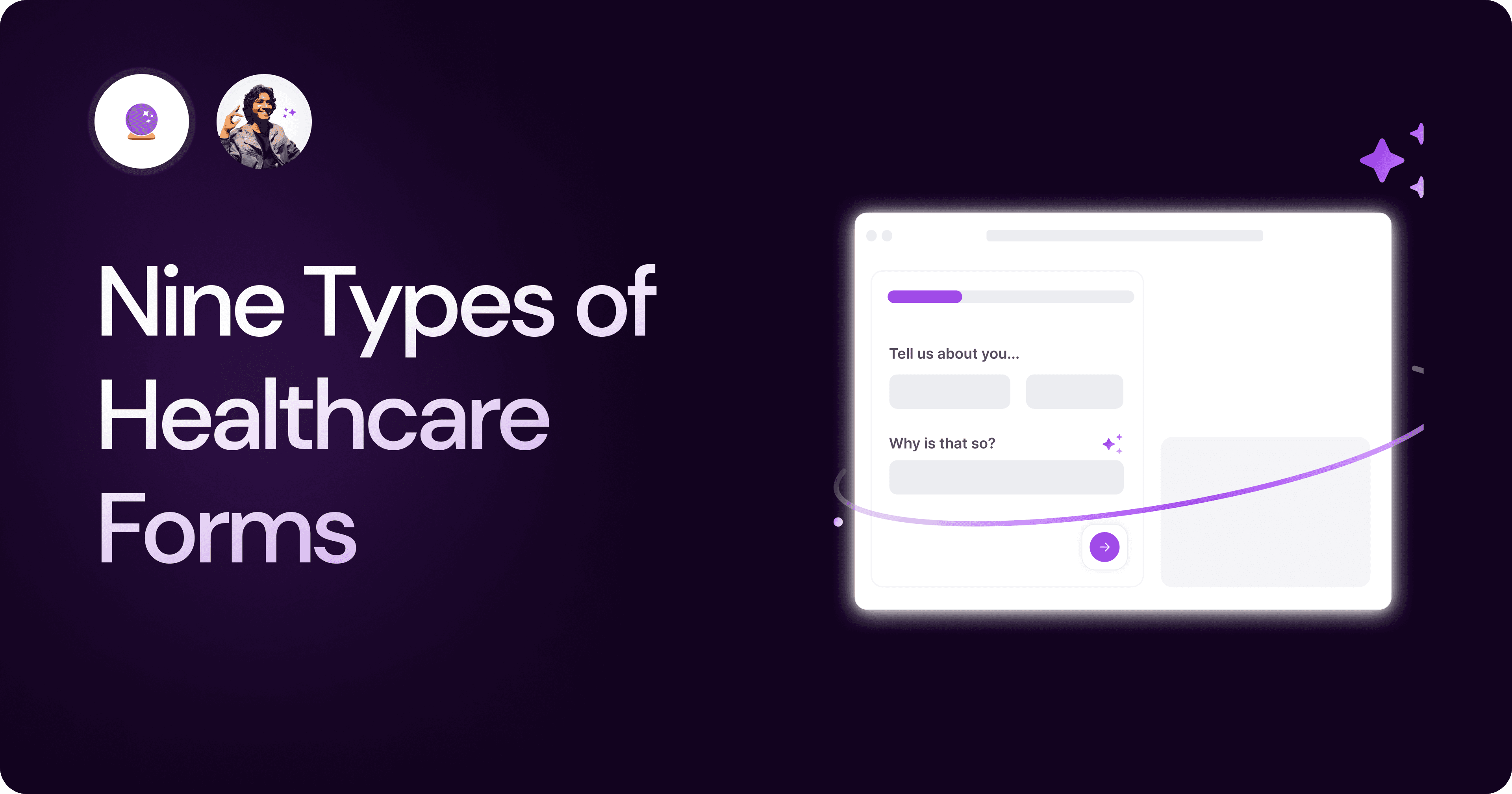
Nine Types of Healthcare and Medical Forms.
Medical forms are a must-have for any healthcare business or practitioner. Learn about the different kinds of medical and healthcare forms.
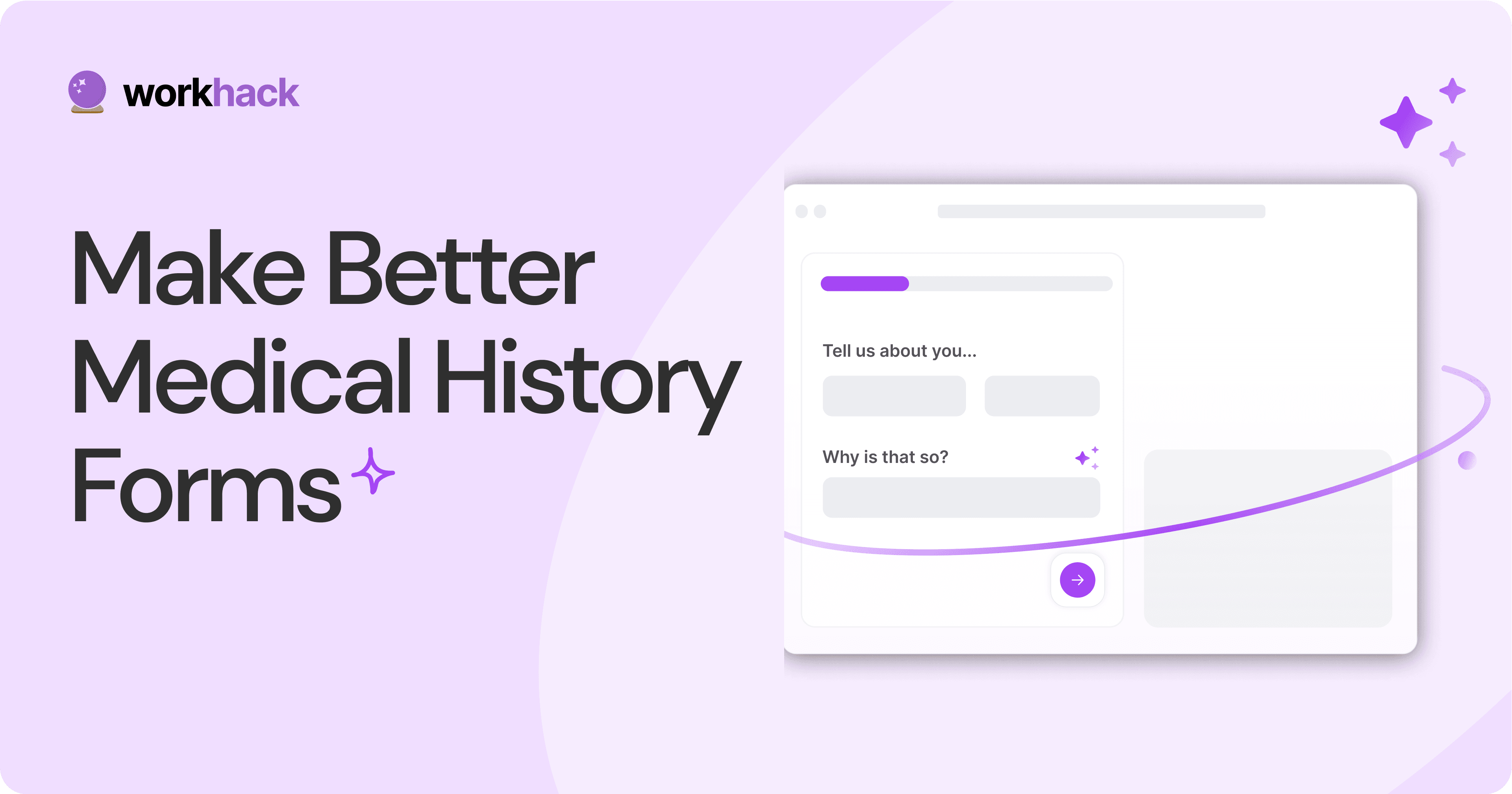
4 Tips for Better Medical History Forms.
Medical history forms are central to patient care, onboarding, and medical administration records. Learn how to make them easier to fill.
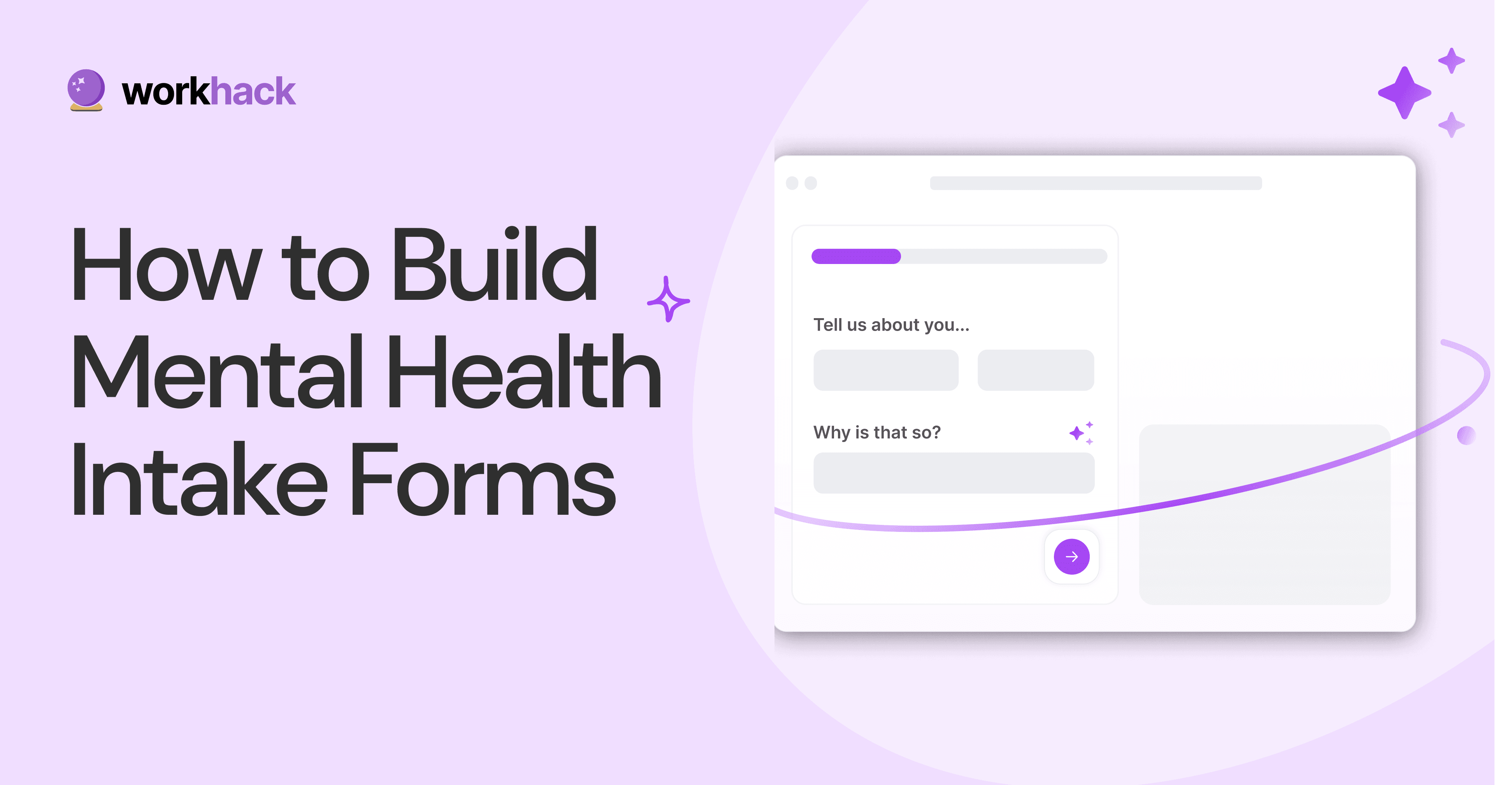
How to Build Mental Health Intake Forms?
Mental health intake forms are not like patient intake forms. Mental health intake forms deal with far more sensitive data and have specific design methods.
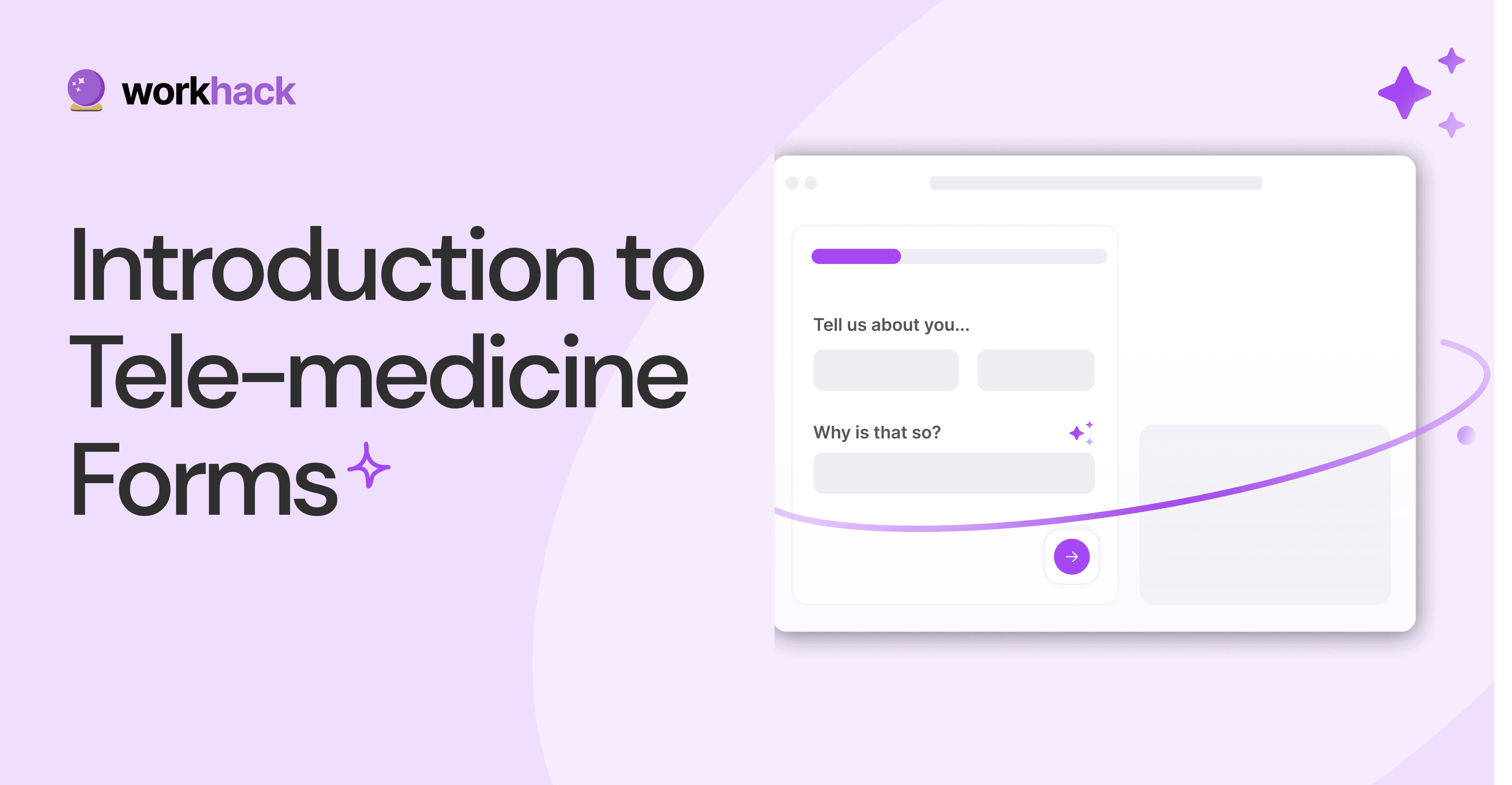
What, Why and How of Telemedicine Forms.
Telemedicine is on the rise and with different form builders out there, which one best suits your needs as a healthcare services provider?
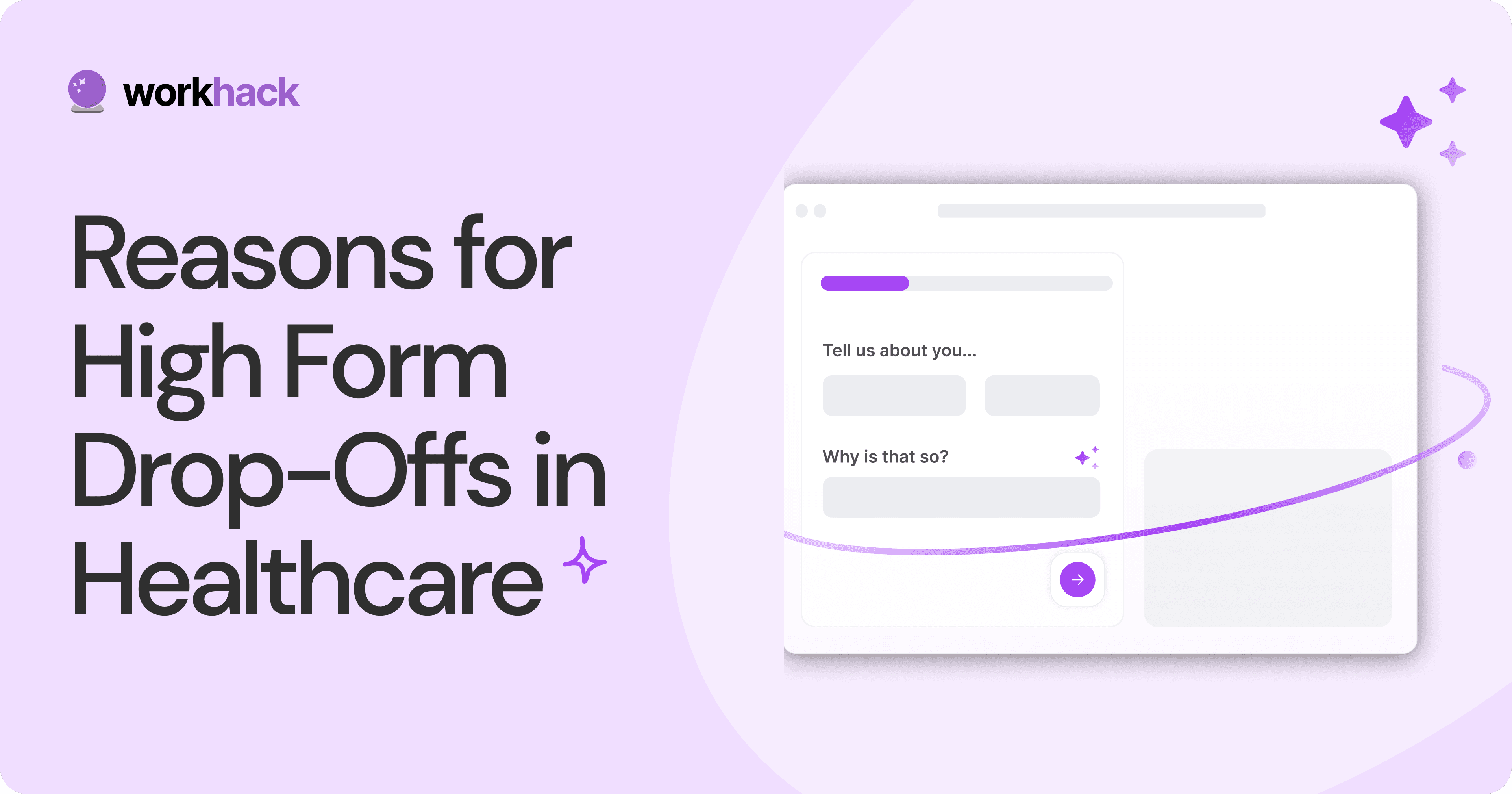
3 Reasons for Major Drop-Offs in Medical Forms.
No matter which healthcare form we pick, there are major drop-off reasons. We shall dive into the top 3 and learn how to resolve them in your next form.
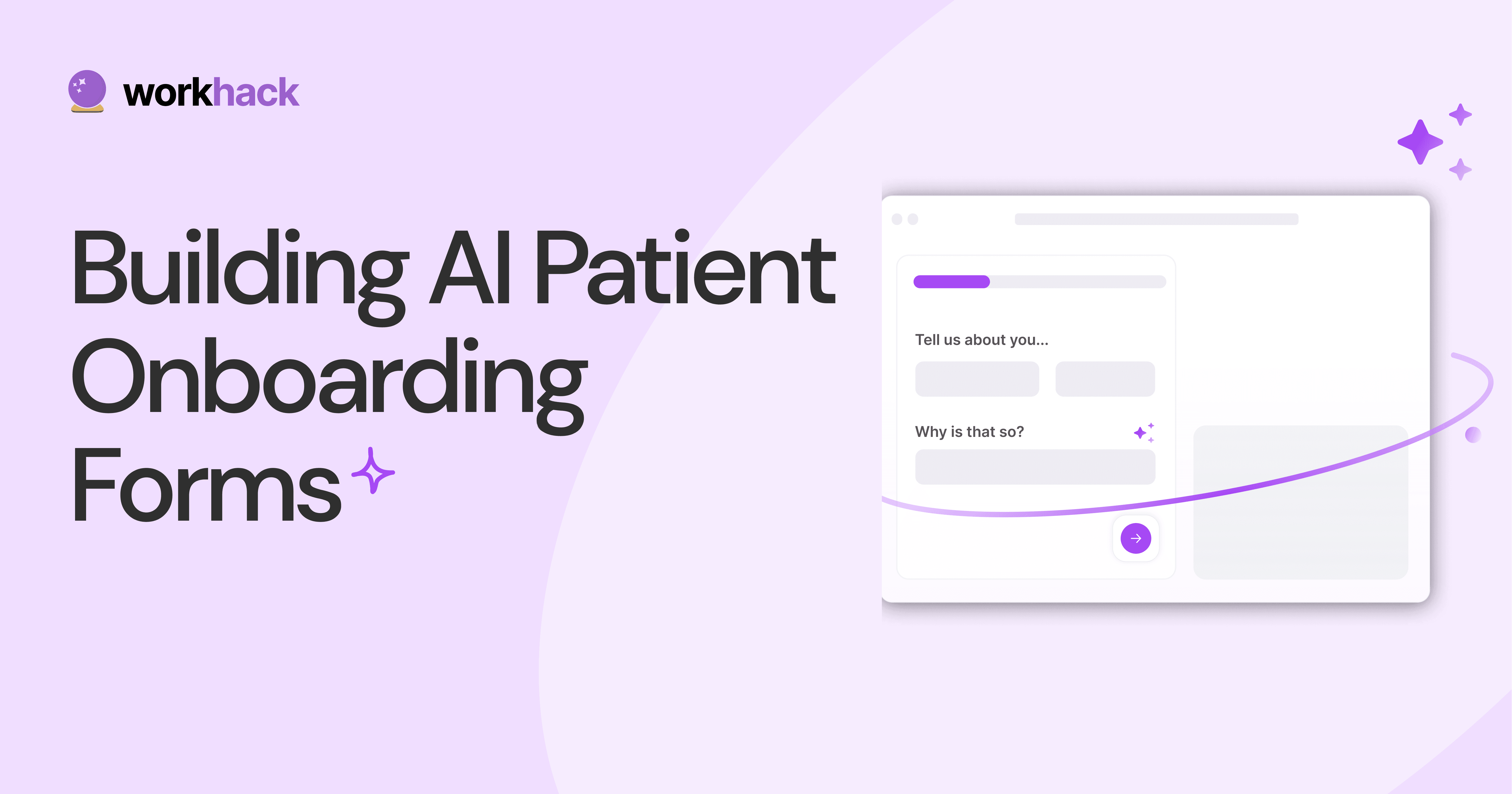
Patient Onboarding Forms - From Click to Clinic.
Patient onboarding forms are the first touchpoint for patients; getting this right for higher conversion rates is a must-have. Learn how to perfect them now.
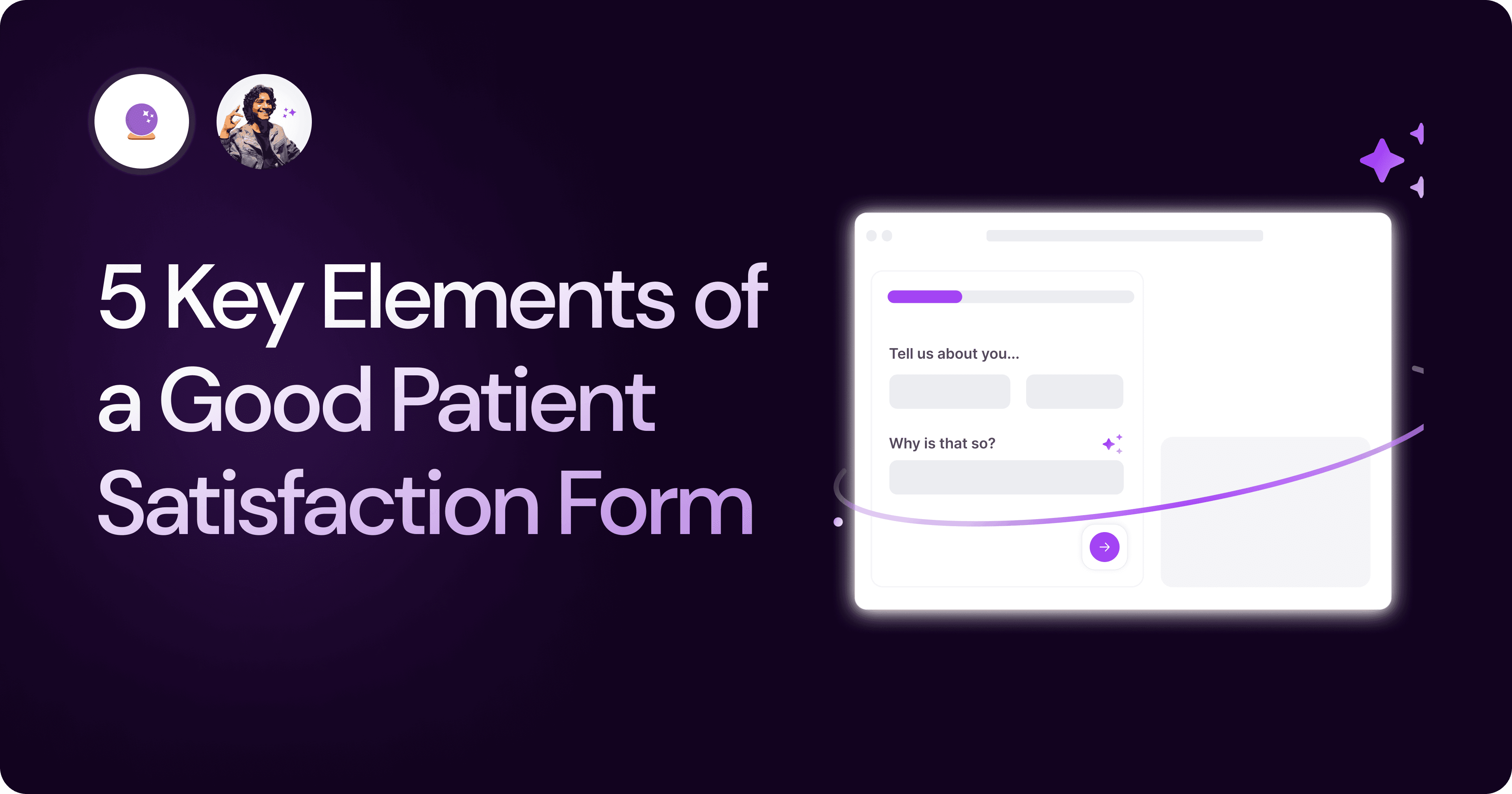
5 Key Parts of a Good Patient Satisfaction Form.
The goal of patient satisfaction surveys is to course-correct the services of a healthcare provider. Patient feedback leads to a culture of patient-centric care.
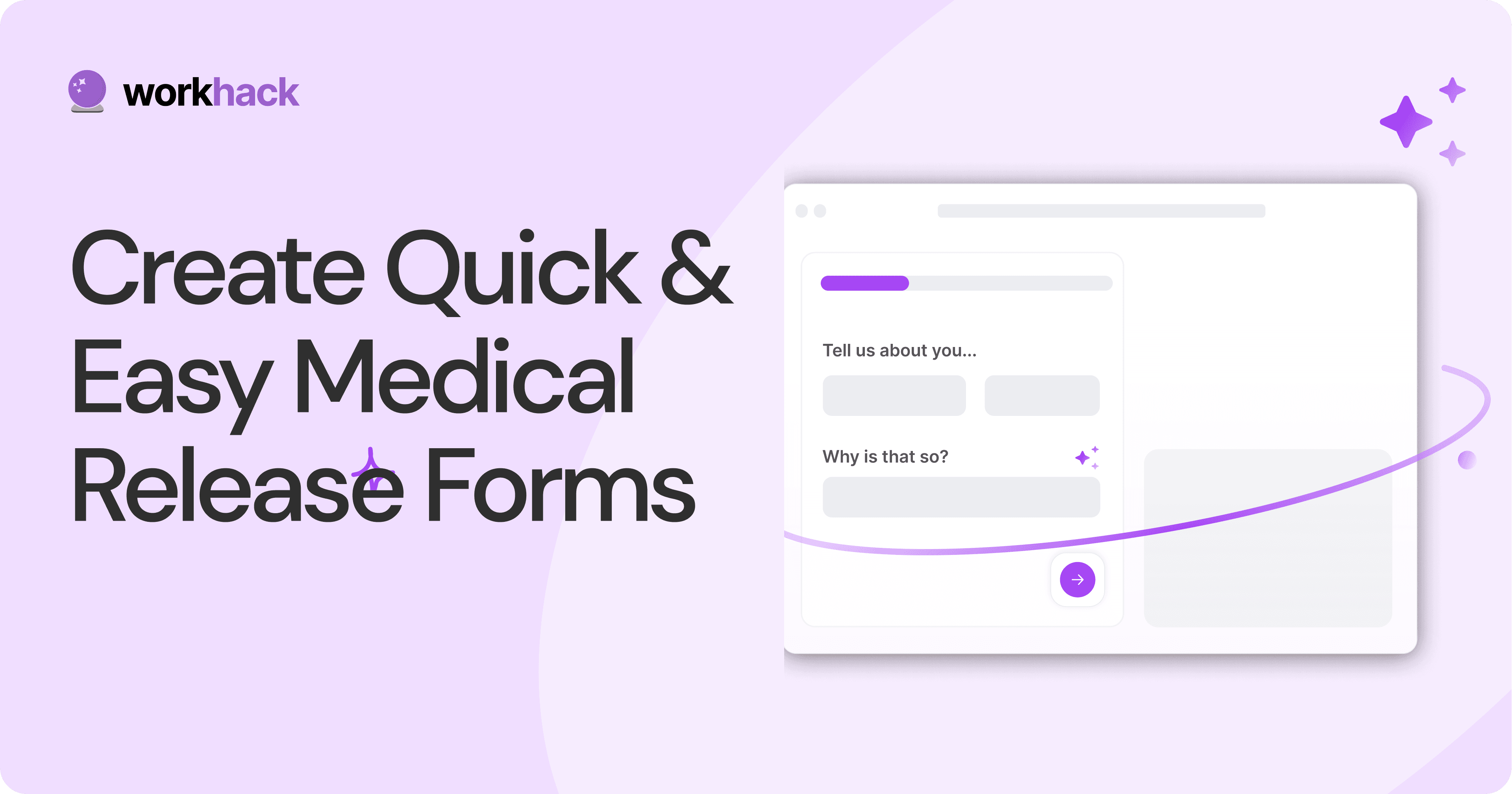
Build Quick and Easy Medical Release Forms.
Every HIPAA-compliant healthcare provider comes across medical release forms that involve details from medical history forms. Can they be shipped fast? Yes.

Nine Types of Healthcare and Medical Forms.
Medical forms are a must-have for any healthcare business or practitioner. Learn about the different kinds of medical and healthcare forms.

4 Tips for Better Medical History Forms.
Medical history forms are central to patient care, onboarding, and medical administration records. Learn how to make them easier to fill.

How to Build Mental Health Intake Forms?
Mental health intake forms are not like patient intake forms. Mental health intake forms deal with far more sensitive data and have specific design methods.

What, Why and How of Telemedicine Forms.
Telemedicine is on the rise and with different form builders out there, which one best suits your needs as a healthcare services provider?

3 Reasons for Major Drop-Offs in Medical Forms.
No matter which healthcare form we pick, there are major drop-off reasons. We shall dive into the top 3 and learn how to resolve them in your next form.

Patient Onboarding Forms - From Click to Clinic.
Patient onboarding forms are the first touchpoint for patients; getting this right for higher conversion rates is a must-have. Learn how to perfect them now.

5 Key Parts of a Good Patient Satisfaction Form.
The goal of patient satisfaction surveys is to course-correct the services of a healthcare provider. Patient feedback leads to a culture of patient-centric care.

Build Quick and Easy Medical Release Forms.
Every HIPAA-compliant healthcare provider comes across medical release forms that involve details from medical history forms. Can they be shipped fast? Yes.

Nine Types of Healthcare and Medical Forms.
Medical forms are a must-have for any healthcare business or practitioner. Learn about the different kinds of medical and healthcare forms.

4 Tips for Better Medical History Forms.
Medical history forms are central to patient care, onboarding, and medical administration records. Learn how to make them easier to fill.

How to Build Mental Health Intake Forms?
Mental health intake forms are not like patient intake forms. Mental health intake forms deal with far more sensitive data and have specific design methods.

What, Why and How of Telemedicine Forms.
Telemedicine is on the rise and with different form builders out there, which one best suits your needs as a healthcare services provider?

3 Reasons for Major Drop-Offs in Medical Forms.
No matter which healthcare form we pick, there are major drop-off reasons. We shall dive into the top 3 and learn how to resolve them in your next form.

Patient Onboarding Forms - From Click to Clinic.
Patient onboarding forms are the first touchpoint for patients; getting this right for higher conversion rates is a must-have. Learn how to perfect them now.

5 Key Parts of a Good Patient Satisfaction Form.
The goal of patient satisfaction surveys is to course-correct the services of a healthcare provider. Patient feedback leads to a culture of patient-centric care.

Build Quick and Easy Medical Release Forms.
Every HIPAA-compliant healthcare provider comes across medical release forms that involve details from medical history forms. Can they be shipped fast? Yes.

Nine Types of Healthcare and Medical Forms.
Medical forms are a must-have for any healthcare business or practitioner. Learn about the different kinds of medical and healthcare forms.

4 Tips for Better Medical History Forms.
Medical history forms are central to patient care, onboarding, and medical administration records. Learn how to make them easier to fill.

How to Build Mental Health Intake Forms?
Mental health intake forms are not like patient intake forms. Mental health intake forms deal with far more sensitive data and have specific design methods.

What, Why and How of Telemedicine Forms.
Telemedicine is on the rise and with different form builders out there, which one best suits your needs as a healthcare services provider?

3 Reasons for Major Drop-Offs in Medical Forms.
No matter which healthcare form we pick, there are major drop-off reasons. We shall dive into the top 3 and learn how to resolve them in your next form.

Patient Onboarding Forms - From Click to Clinic.
Patient onboarding forms are the first touchpoint for patients; getting this right for higher conversion rates is a must-have. Learn how to perfect them now.

5 Key Parts of a Good Patient Satisfaction Form.
The goal of patient satisfaction surveys is to course-correct the services of a healthcare provider. Patient feedback leads to a culture of patient-centric care.

Build Quick and Easy Medical Release Forms.
Every HIPAA-compliant healthcare provider comes across medical release forms that involve details from medical history forms. Can they be shipped fast? Yes.
Subscribe to stay updated.
Subscribe to stay updated.
Subscribe to stay updated.
HC

HC

HC

HC

70+ people from across industries read our emails.
HC

HC

70+ people from across industries read our emails.
HC

HC

HC

70+ people from across industries read our emails.




Bangalore, India / San Francisco, US
WorkHack Inc. 2023
Bangalore, India
San Francisco, US
WorkHack Inc. 2023
WorkHack Inc. 2023
Bangalore, India / San Francisco, US
WorkHack Inc. 2023
Bangalore, India / San Francisco, US



